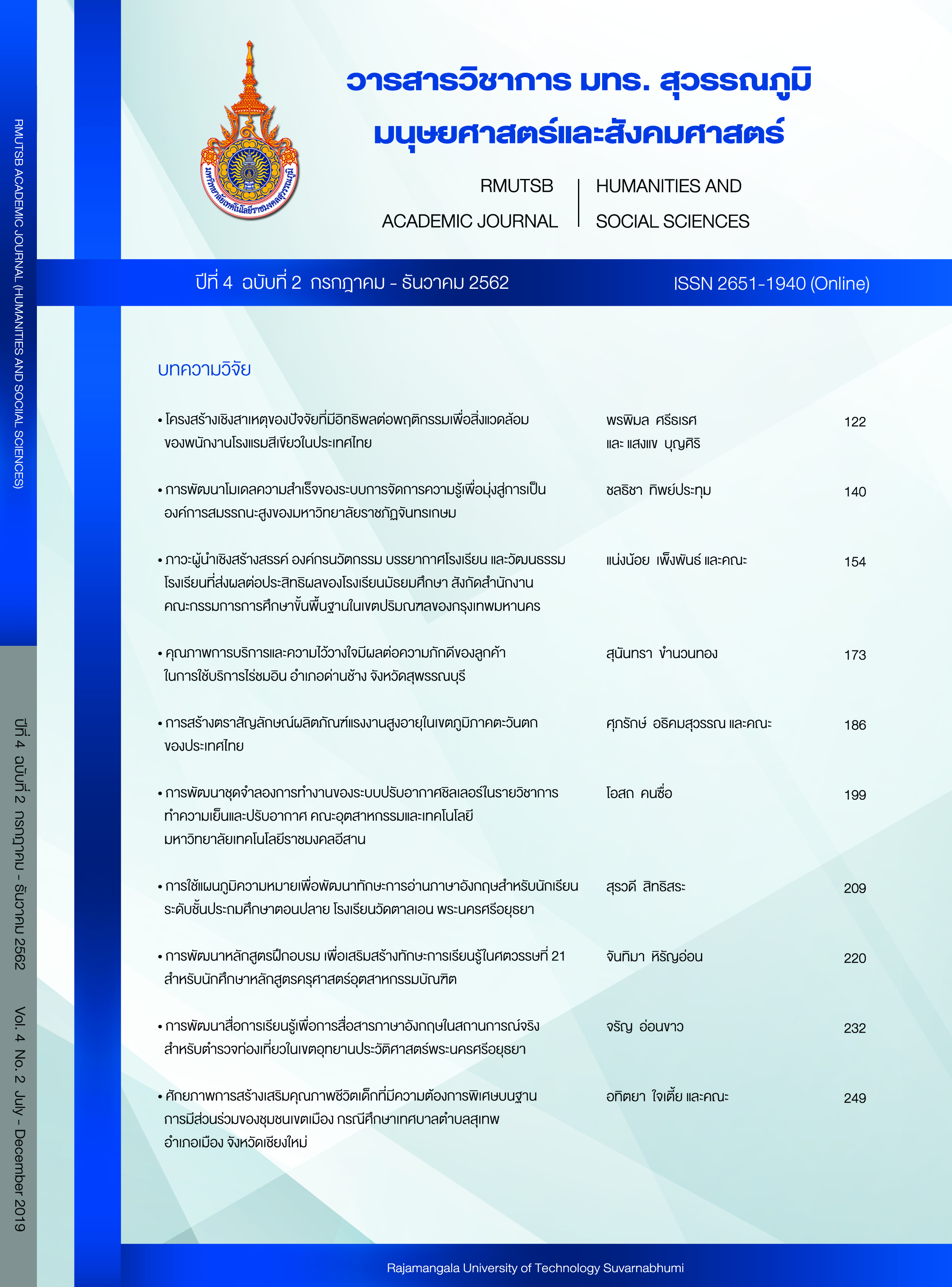The development of a success model of knowledge management system to becoming a high performance organization of Chandrakasem Rajabhat University
Main Article Content
Abstract
The objectives of this research are to 1) develop a success model of knowledge management system to becoming a high performance organization and 2) verify accordance and influent values of the model. This is a mixed method research using exploratory sequential design. The first step is to study phenomenology to confirm research framework from 3 experts which leads to research hypothesis, then test causal relation from 360 samples. The statistics used are the second order confirmatory factor analysis and structural equation model. Then use a qualitative method again for developing research model in conjunction with the result from quantitative method. The results show that 1) intrinsic reward model features sense of self-esteem and sense of recognition, knowledge management model features creating and organizing knowledge systems as well as sharing and applying knowledge, and high performance organization model features management quality and workforce quality 2) the developed model has in accordance and align with the empirical data, (chi-square=14.69, chi-square/df=2.44, df= 6, p=0.02, GFI=0.99, TLI=0.98, CFI=0.99, NFI=0.99, RMSEA=0.06), in which all factors have intercompany positive influence which are in line with the research hypothesis.
Article Details
References
Armstrong, M. (2007). A handbook of employee reward management and practice (2nd ed.). London and Philadelphia: Kogan.
Buytendijk, F. (2006). Five key to building high performance organization. Business Performance Management Magazine, 4(1), 24-30.
Cadrain, D. (2008). Sexual equity in the workplace. HR Magazine, 53(9), 44-48, 50.
Chang, C., & Lin, T. (2015). The role of organizational culture in the knowledge management process. Journal of Knowledge Management, 19(3), 433-455.
Conger, J. A., & Kanungo, R. N. (1988). The empowerment process: Integrating theory and practice. Academy of Management Review, 13, 471-482.
Creswell, J. W. (2007). Qualitative research inquiry and research design: Choosing among five approach (2nd ed.). California: Sega Publication.
Drucker, P. F. (1993). Post-capitalist society. New York: Harper Business.
Hair, J. F., Black, W. C., Babin, B. J., & Anderson, R. E. (2010). Multivariate data analysis: A global perspective. NJ: Pearson.
Herring, C. (2009). Does diversity pay?: Race, gender, and the business case for diversity. American Sociological Review, 74(2), 208-224.
Homans, C. (1958). Social behavior as exchange. American Journal of Sociology, 63(6), 597-606.
Huey, M. T. (2002). The influence of nurses’ working motivation and job satisfaction on intention to quit: an empirical investigation in Taiwan. International Journal of Nursing Studies, 39(8), 867-878.
Ivancevich, J. M., Konopaske, R., & Matteson, M. T. (2011). Organizational behavior and management (9th ed.). New York: McGraw-Hill.
Kaiyawan, Y. (2013). Multivariate statistical analysis for research. Bangkok: Chulalongkorn University Printing House. (in Thai)
Kline, R. B. (2011). Principles and practice of structural equation modeling (3rd ed.). New York: The Guilford Press.
Macey, W. H., & Schneider, B. (2008). The meaning of employee engagement. Industrial and Organizational Psychology, 1, 3-30.
Markova, G., & Ford, C. (2011). Is money the panacea? Rewards for knowledge workers. International Journal of Productivity and Performance Management, 60(8), 813-823.
Office of Educational Quality Assurant. (2017). Annual of quality assurance in education acedemic year 2017. Chandrakasem Rajabhau University. (in Thai)
Oparaocha, G. O. (2016). Towards building internal social network architecture that drives innovation: a social exchange theory perspective. Journal of Knowledge Management, 20(3), 534-556.
Podisita, C. (2013). Science and art of qualitative research (6th ed.). Bangkok: Amarin Printing & Publishing. (in Thai)
Stumpf, S. A., Tymon, W. G., Favorito, Jr. N., & Smith, R. R. (2013). Employees and change initiatives: intrinsic rewards and feeling valued. Journal of Business Strategy, 34(2), 21-29.
Stumpf, S. A., Tymon, W. G., Robert, Jr. H., & van Dam, N. H. M. (2016). Leading to intrinsically reward professionals for sustained engagement. Leadership & Organization Development Journal, 37(4), 467-486.
Suphanalai, P. (2018). The causal relationship among cultural initiative, motivation arrangement, diversity management and talent management to high performance organization in Thailand (Doctoral dissertation). Silpakorn University, Bangkok. (in Thai)
Tippratum, C. (2016). Intrinsic reward of retirees: study for grounded theory. In A Proceeding The 41st National and 5th International Graduate Research Conference (pp. 45-56). Pathumthani: Alongkorn Rajabhat University under the Rayal Patronahe.
Tippratum, C. (2017). Developing intrinsic reward system in digital era of Chandrakasem Rajabhat University: Discursive practice to social reproduction. In A Proceeding International Conference of Multidisciplinary Approaches on UN Sustainable Development Goals (pp. 98). Nakhon Pathom: Nakhon Pathom Rajabhat University.
Tippratum, C., Kongklay, J., & Kittisaknawin, C. (2017). The role of rewards in human resource management. Journal of Graduate Studies Valaya Alonhkron Rajabhat University, 11(1), 190-201. (in Thai)
Tippratum, C. (2018a). The development of the intrinsic reward model for reinforcing the loyalty behavior to organization and the job performance of the staff in software industry in Thailand (Doctoral dissertation). Silpakorn University, Bangkok. (in Thai)
Tippratum, C. (2018b). A structural equation modelling of leader behavior and intrinsic reward affecting to turnover intention of staff in higher education institution in Thailand. In National Conference Proceeding “SWU Research” 11th Srinakharinwirot University (pp.1-22). Bangkok: Srinakharinwirot University. (in Thai)
Tymon, W. G. Jr., Stumpf, S. A., & Doh, J. P. (2010). Exploring talent management in India: The neglected role of intrinsic rewards. Journal of World Business, 45(2), 109-121.
Vanichbuncha, K. (2007). Statistical analysis: Statistics for management and research (10th ed.). Bangkok: Chulalongkorn University Printing House. (in Thai)


